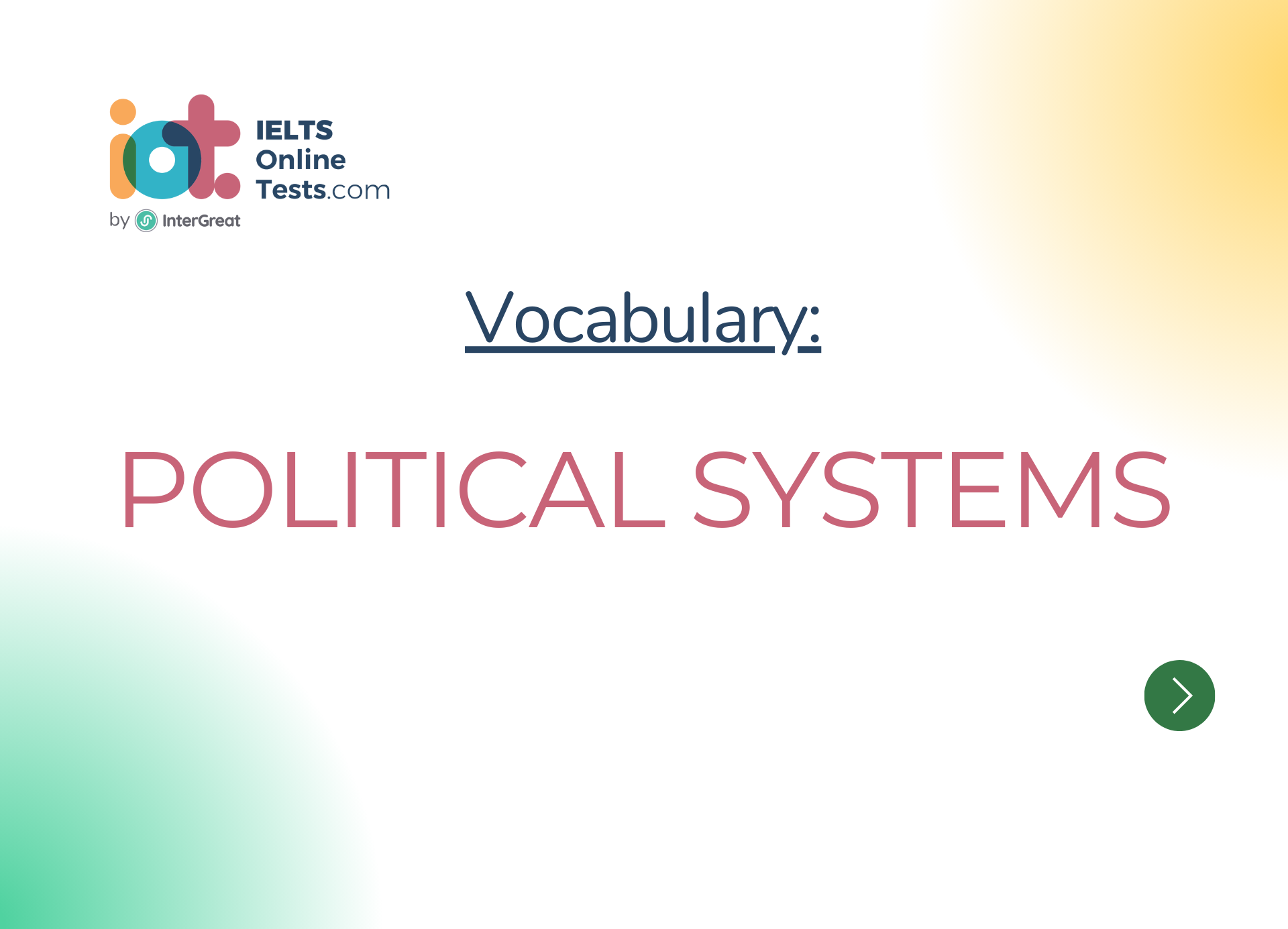
Political systems
Below is a detailed list of vocabulary related to political systems, along with their definitions. Understanding these terms will help you discuss various aspects of political systems during the IELTS exam or any conversations related to politics and governance.
Democracy:
- Definition: A political system in which the power is vested in the people, who elect representatives to make decisions on their behalf.
Republic:
- Definition: A form of government in which the country is considered a "public matter" and is not ruled by a hereditary monarch. The head of state is usually an elected or appointed president.
Monarchy:
- Definition: A political system where a single ruler, typically a king or queen, holds supreme authority over the state.
Constitution:
- Definition: A written or unwritten set of fundamental principles and laws that outline the structure and functions of a government.
Federalism:
- Definition: A system of government in which power is divided between a central authority and various constituent units, such as states or provinces.
Unitary System:
- Definition: A political system in which all power is concentrated in the central government, and regional governments derive authority from it.
Parliamentary System:
- Definition: A system of government in which the executive branch derives its legitimacy from the legislature (parliament) and is accountable to it.
Presidential System:
- Definition: A system of government in which the president is both the head of state and the head of government and is elected independently of the legislature.
Authoritarianism:
- Definition: A political system where power is concentrated in the hands of a single leader or a small elite group, and citizens have limited political freedoms.
Totalitarianism:
- Definition: A political system in which the government has total control over almost all aspects of public and private life.
Oligarchy:
- Definition: A political system in which a small group of individuals, often from the same social, economic, or political class, hold significant power and influence.
Plutocracy:
- Definition: A political system in which the wealthy or the ruling class holds the dominant power.
Theocracy:
- Definition: A political system in which religious leaders or religious institutions hold political authority.
Separation of Powers:
- Definition: The division of government responsibilities among different branches, such as the executive, legislative, and judicial branches, to prevent the concentration of power.
Checks and Balances:
- Definition: A system that allows each branch of government to limit the powers of the other branches, preventing an abuse of power.
Rule of Law:
- Definition: The principle that all individuals and institutions, including the government, are subject to and accountable to the law.
Civil Liberties:
- Definition: The fundamental individual rights and freedoms, such as freedom of speech, religion, and assembly, protected by law from government interference.
Civil Rights:
- Definition: The rights of citizens to political and social freedom and equality, often protected by laws or the constitution.
Political Ideology:
- Definition: A set of beliefs and values that shape an individual's or a group's understanding of politics and guide their political actions.
Liberalism:
- Definition: A political ideology that advocates for individual freedoms, limited government intervention, and protection of civil liberties.
Conservatism:
- Definition: A political ideology that supports traditional values, social stability, and limited government involvement.
Socialism:
- Definition: A political and economic theory advocating for public ownership and control of the means of production and a more equitable distribution of wealth.
Capitalism:
- Definition: An economic and political system in which the means of production and distribution are privately or corporately owned, and economic decisions are driven by supply and demand.
Fascism:
- Definition: A political ideology characterized by strong authoritarian control, extreme nationalism, and suppression of opposition.
Communism:
- Definition: A political and economic theory advocating for the abolition of private ownership and a classless society with collective ownership of the means of production.
Electoral System:
- Definition: The method used to elect representatives to public office, such as first-past-the-post, proportional representation, or electoral college.
Political Party:
- Definition: A group or organization of people who share similar political views and seek to influence public policy through participation in elections.
Coalition Government:
- Definition: A government formed by two or more political parties that agree to work together to govern.
Lobbying:
- Definition: The act of attempting to influence decisions made by government officials in favor of a particular cause or interest group.
Civic Engagement:
- Definition: The active participation of citizens in the political, economic, and social life of their community and country.
Please note that political systems are complex, and this vocabulary provides a foundation for discussing and understanding various aspects of political systems during the IELTS exam or any political discussions.




